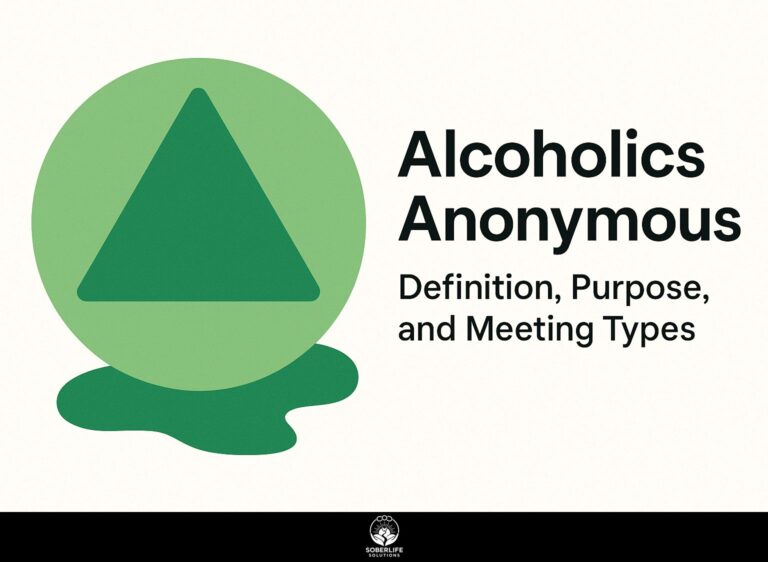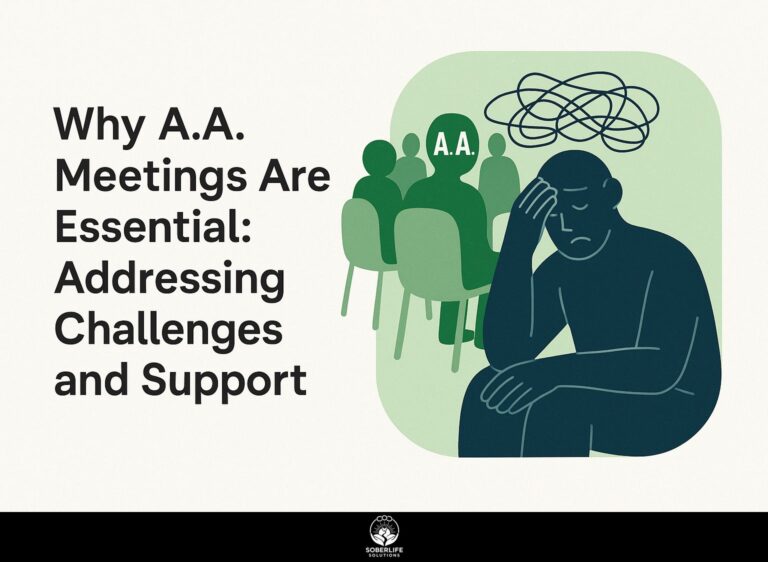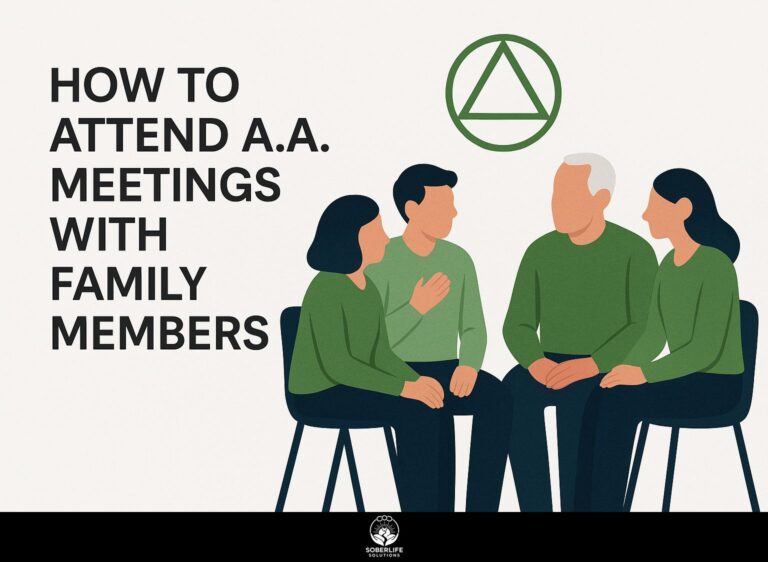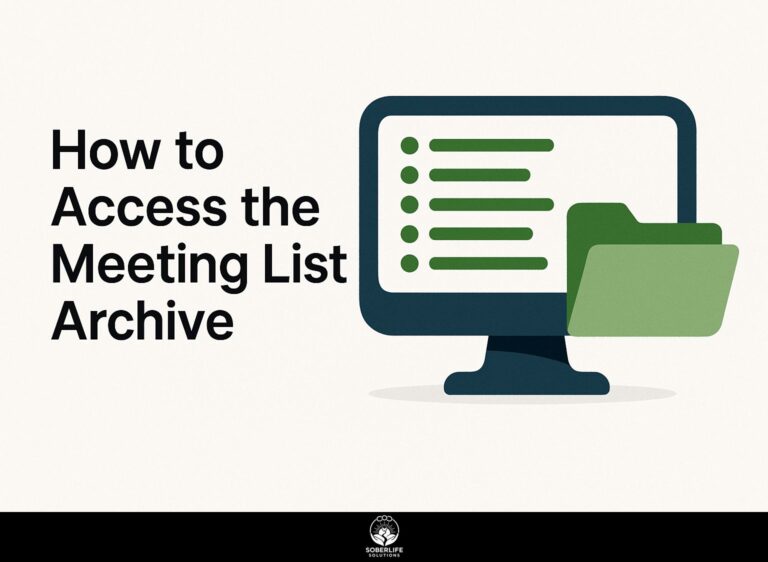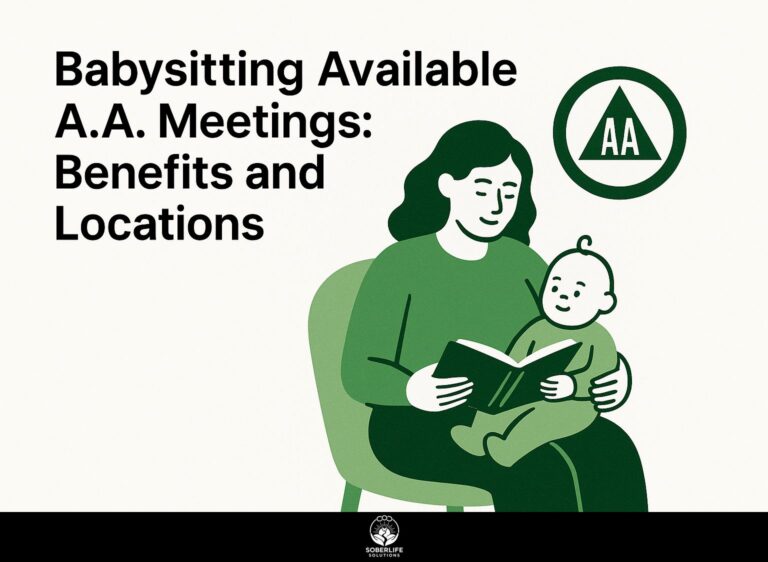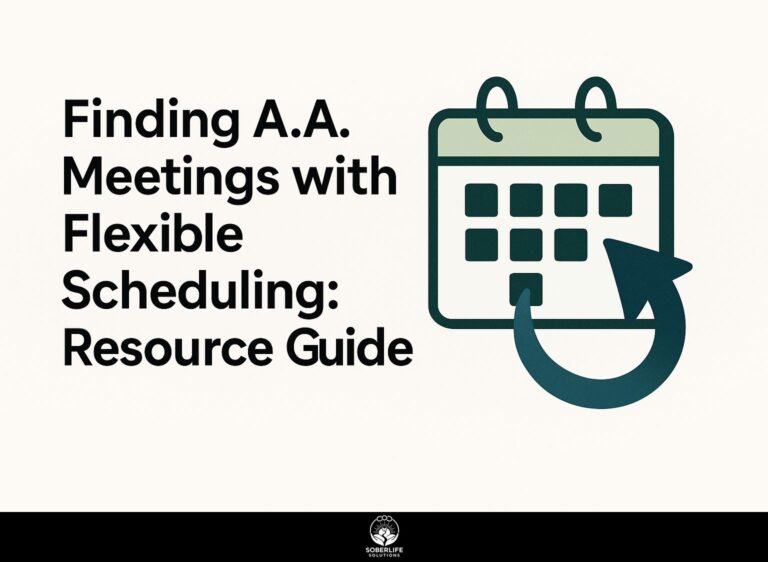What to Expect at Your First A.A. Meeting: Guide for New Members
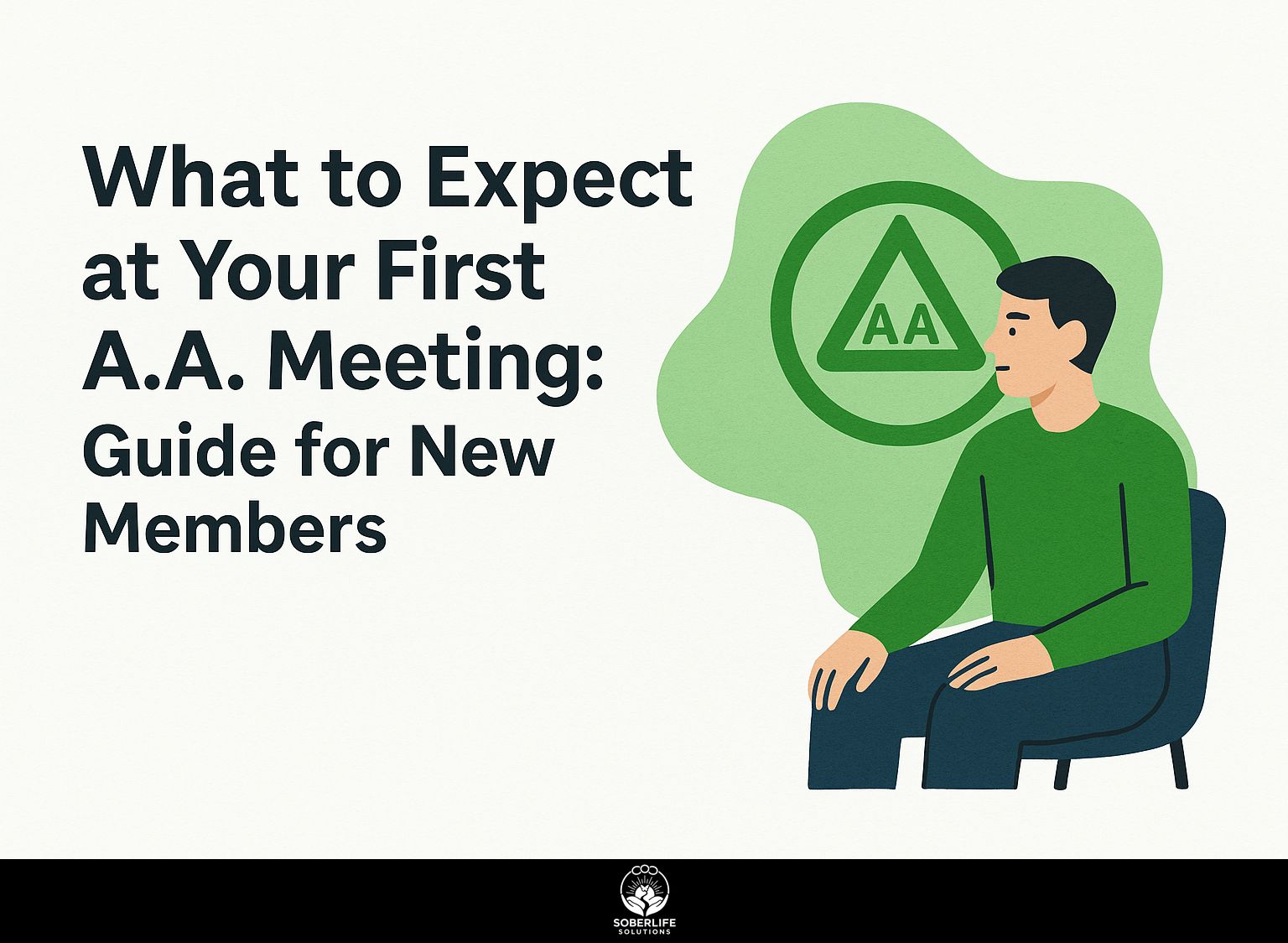
Are you nervous about attending your first A.A. meeting? You’re not alone. Many newcomers to Alcoholics Anonymous find comfort in knowing that these gatherings are rooted in experience, strength, and hope. A.A. members share their stories about staying sober and following the Twelve Steps, offering important support for keeping sober. This guide will help you get ready for your first meeting, so you feel comfortable and confident as you begin this important step toward healing.
Key Takeaways:
What is Alcoholics Anonymous?
Founded in 1935, Alcoholics Anonymous is a fellowship of individuals who share their stories and support each other through the Twelve Steps of recovery, backed by the foundational text, the Big Book.
The Twelve Steps provide a structured approach to overcoming alcoholism, emphasizing personal accountability and spiritual growth.
For instance, Step One involves admitting powerlessness over alcohol, which helps individuals acknowledge their struggles. The Big Book is an essential guide, offering true stories and experiences that members connect with, creating a sense of community.
Many participants appreciate the benefits of attending meetings regularly and joining discussions, which help build a supportive community. As detailed by Wikipedia, the history of Alcoholics Anonymous has profoundly influenced the structure and success of these meetings. If you’re looking to find or update meeting schedules, you can [learn more about accessing and updating A.A. meeting lists](https://soberlifesolutions.com/update-aa-meeting-lists-guide/).
Worksheets based on the Twelve Steps can help personal reflection, supporting the recovery process.
Purpose and Goals of A.A.
Alcoholics Anonymous focuses on helping people stop drinking by providing a clear plan for personal development and recovery. This is done through community support and sharing personal stories.
AA promotes sobriety through its core principles, notably the Twelve Steps, which guide members toward self-reflection and accountability.
Weekly meetings help build a sense of community, allowing participants to share their experiences and difficulties. Measurable outcomes include a reported 30% success rate for members remaining sober after one year, according to AA’s own research. This aligns with findings from NPR, which suggests Alcoholics Anonymous is effective, though it may not work for everyone.
Engaging with a sponsor-an experienced member who provides guidance-also significantly increases the chances of long-term sobriety. With both individual and group support, AA nurtures an environment conducive to healing.
Preparing for Your First Meeting
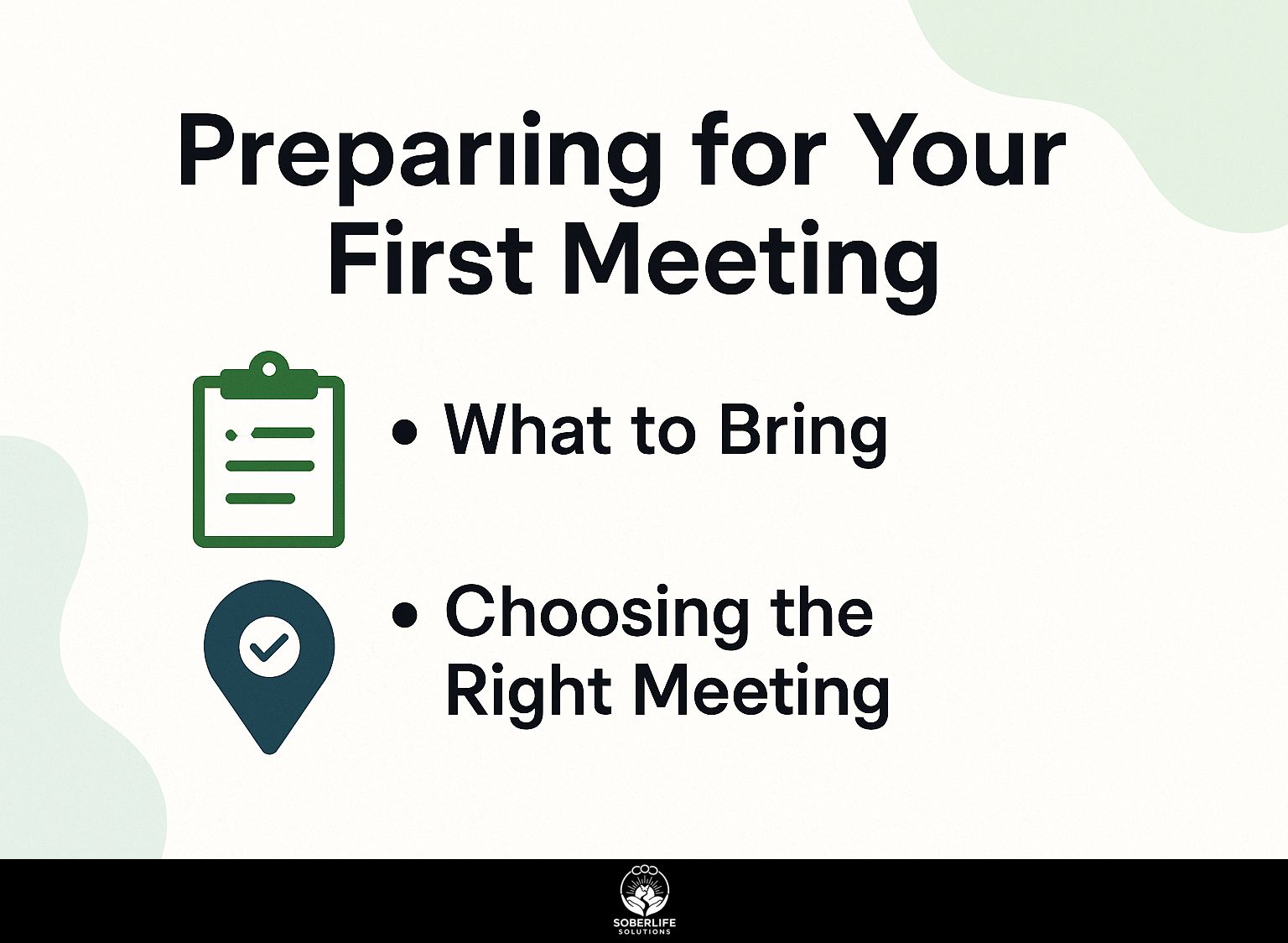
Getting ready for your first A.A. meeting can make the experience better by creating a welcoming space where you feel at ease talking about your experiences with others. For more detailed guidance, explore our comprehensive guide for beginners.
What to Bring
For your first A.A. meeting, you may find it helpful to bring a notepad, a pen for writing notes, and any A.A. materials that are important to you, such as the Big Book or Daily Reflections.
Think about bringing personal items that make you feel comfortable, like a favorite coffee mug or a small cushion. It’s also helpful to have a water bottle, as staying hydrated can ease nerves.
If you find it beneficial, consider packing a calming object, such as a stress ball or a fidget spinner, to help maintain focus. Remember, these items can make things better for you and help you mingle with others, making the first meeting feel more at ease.
Choosing the Right Meeting
Choosing the appropriate type of A.A. meeting is important; open meetings and closed meetings are available to suit the needs and comfort of new members.
Open meetings allow anyone, whether they are an alcoholic or not, to attend and learn about A.A. Closed meetings, in contrast, are for those who identify as alcoholics, creating a more intimate and supportive environment.
To find a suitable meeting, visit the A.A. website (www.aa.org), where you can search for local groups by entering your zip code. Think about calling a local A.A. hotline for specific advice or help with your choices. For expanded context, HelpGuide provides insights into how A.A. meetings compare with other peer support groups, offering a broader understanding of support options for alcohol addiction.
What Happens at an A.A. Meeting
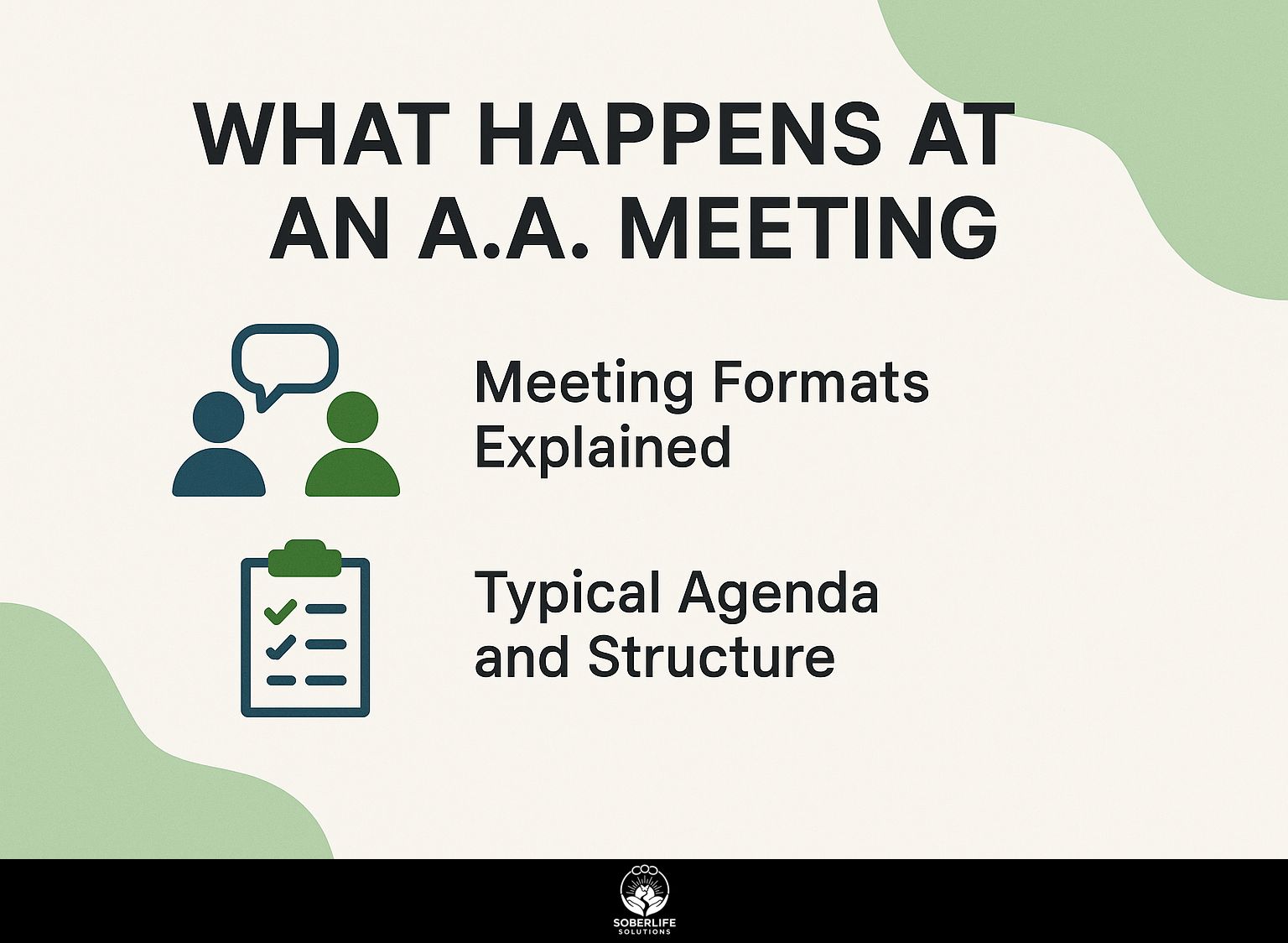
A.A. meetings usually have a set plan that encourages participants to share and connect with each other in a respectful way, providing a supportive place for recovery.
Meeting Formats Explained
A.A. meetings can vary in format, including discussion meetings that focus on group sharing and speaker meetings where a member shares their personal story.
Other common formats include meetings focused on the Twelve Steps, where people talk about and discuss these steps, and literature meetings, where participants read from A.A. literature and talk about what it means.
Expect a range of engagement levels; discussion meetings promote open sharing, while step meetings often guide members through a structured approach to recovery. In literature meetings, people gain knowledge by talking about books and learning about A.A.’s principles. For a deeper understanding of these formats, see also AA Meeting Types: Speaker, Big Book & Proof of Attendance.
Each meeting type caters to different needs, offering diverse pathways for connection and support.
Typical Agenda and Structure
An average A.A. meeting starts with a greeting and the Serenity Prayer, then moves into sharing personal stories, creating a structured but inviting space for recovery.
After the initial welcome and prayer, the meeting often includes a reading of the Twelve Steps, which serves as a reminder of the shared goals of recovery.
Participants then engage in a round-robin sharing format, allowing each member to speak without interruption, promoting a respectful atmosphere. At the end, members often have a group talk to share their opinions about group issues and make sure everyone is heard.
This approach encourages community involvement and responsibility, which is essential for long-term recovery.
Meeting Etiquette
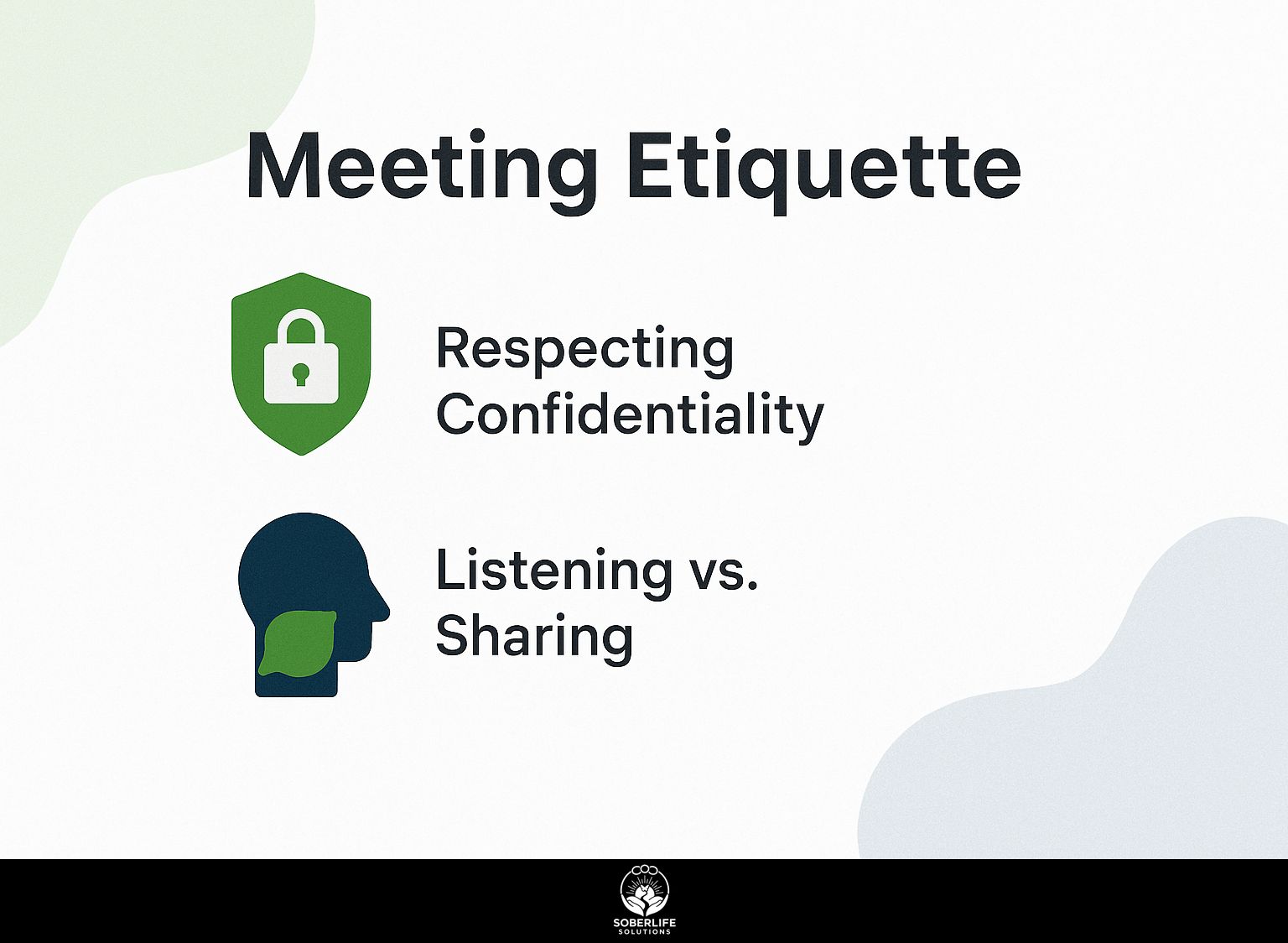
Knowing how to act in meetings is important for making sure that everyone feels at ease and respected during conversations.
Respecting Confidentiality
Protecting privacy is important in A.A. It makes sure that conversations during meetings stay private, creating a space where people can talk openly and feel safe.
When confidentiality is breached, it can lead to significant discomfort among members. For instance, if one person discloses another’s personal story outside the meeting, trust erodes, leading to fewer members feeling safe to share their struggles.
This can lead to a group that is not involved and does not trust each other, which can slow down recovery. To keep things private, A.A. asks members to follow the tradition of anonymity, respecting each person’s privacy and creating a supportive space for recovery.
Listening vs. Sharing
In A.A. meetings, it’s important to balance listening and talking to build mutual support and strengthen emotional connections with others.
Active listening means hearing words and recognizing the emotions behind them.
To develop this skill, members can try these methods:
- maintain eye contact
- show empathy through nodding
- ask open-ended questions like, “How did that experience shape you?”
When it’s your turn to share, aim for conciseness-give a brief recount of experiences without dominating the conversation. This method ensures everyone is heard and lets the group benefit from a variety of opinions and experiences, improving the sense of unity.
Understanding the A.A. Community
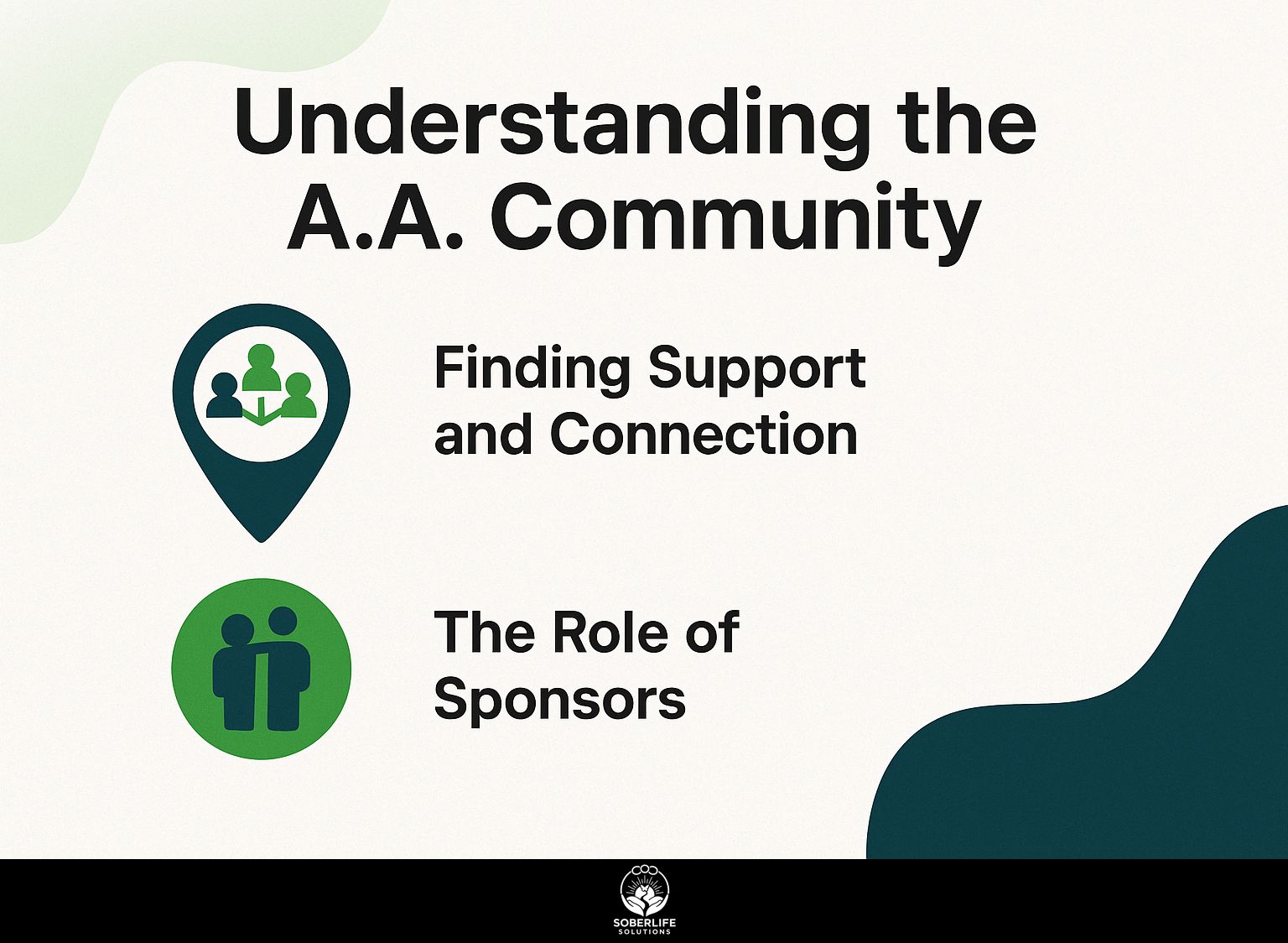
The A.A. community relies on support from others and shared stories, providing important help for those managing their recovery.
Finding Support and Connection
Getting help and building relationships in the A.A. community can improve your recovery, with local meetings being important for sharing experiences and getting support.
To tap into these resources, start by locating local A.A. meetings through the official A.A. website or by searching community boards.
Attending these meetings lets you safely share your experiences and build connections with people who relate to your path.
Consider participating in online forums or local A.A. events to further build your support network. Building connections with others who are also recovering can significantly increase a person’s commitment and motivation to remain sober (our guidelines for attending A.A. meetings safely offers more insights).
The Role of Sponsors
Sponsors play a key role in A.A. because they guide and support newcomers by sharing personal experiences to help them overcome challenges in recovery.
A supportive sponsor can greatly help your recovery process. They help you understand your personal issues, recommend ways to address them, and make sure you follow through.
When selecting a sponsor, consider the following tips:
- Look for someone with a solid recovery track record, preferably someone who has faced similar challenges.
Reach out to potential sponsors by sharing your need for help and inquiring about their time in A.A. This honest conversation clarifies what to expect and builds a trustworthy relationship important for getting the right support.
After the Meeting
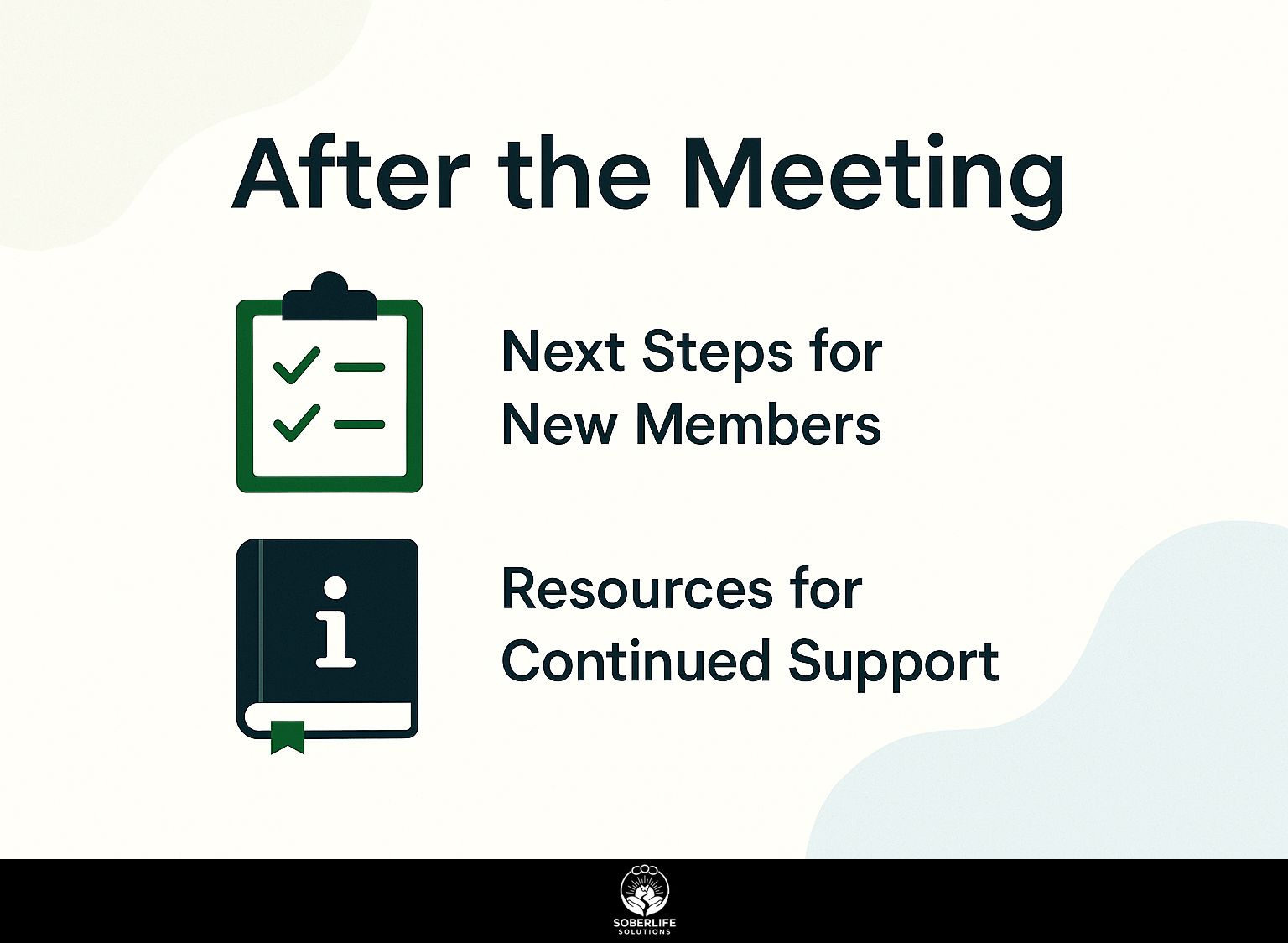
What you do after an A.A. meeting matters just as much as going to one; actively working on your recovery can support your progress and strengthen the lessons you have gained.
Next Steps for New Members
For those new to A.A., the next steps after a meeting might involve contacting sponsors, reading A.A. books or pamphlets, and joining additional discussions.
Consider joining a local A.A. group or attending a community event. This strengthens your support network and helps you build relationships with others who have similar experiences.
Many find it beneficial to keep a daily journal as a reflective practice, helping to clarify thoughts and emotions. Utilizing A.A. resources such as the Big Book can reinforce the core principles of recovery.
Engaging in service work, like volunteering at an A.A. meeting, often strengthens commitment to sobriety while offering a sense of purpose.
Resources for Continued Support
People in recovery have different support choices, such as A.A. literature, treatment centers like Cumberland Heights in Nashville, and programs like SMART Recovery.
Plus these options, online support groups like InTheRooms offer virtual meetings that provide flexibility and a sense of community.
Many individuals find that using mindfulness apps, such as Headspace or Calm, helps manage stress and anxiety during recovery. Interestingly, using these phone apps to manage cravings can be a hidden gem in enhancing your recovery journey.
Using these resources together can build a strong support system, greatly increasing the likelihood of long-term sobriety.
Regular participation with various groups and resources encourages a complete approach, dealing with both emotional and behavioral parts of recovery.
Frequently Asked Questions
What can I expect at my first A.A. Meeting?
At your first A.A. meeting, you can expect to find a welcoming and supportive group of people who share a common goal – recovery from alcoholism. People will share their stories and experiences, and you can join in conversations and activities with the group.
Do I have to speak at my first A.A. Meeting?
No, you do not have to speak at your first A.A. meeting. Many members choose to listen and observe at their first meeting, and that is completely okay. You can participate in group discussions and activities as much or as little as you feel comfortable.
What should I bring to my first A.A. Meeting?
It is recommended to bring an open mind and a willingness to listen and learn. Some people also choose to bring a notebook and pen to take notes or jot down any helpful information. Some meetings might request a small donation to help with costs, but it’s not mandatory.
Is there a dress code for A.A. Meetings?
No, there is no specific dress code for A.A. Meetings. It is recommended to dress comfortably and wear something that makes you feel at ease. Remember, the focus of the meeting is on recovery, not your appearance.
What if I don’t feel comfortable at my first A.A. Meeting?
If you do not feel comfortable at your first A.A. meeting, it is okay to try a different meeting or group. Each A.A. meeting may have its own unique atmosphere, so it’s important to find one that feels like the right fit for you.
Can I attend A.A. Meetings if I am not an alcoholic?
A.A. Meetings are open to anyone who has a desire to stop drinking. While the program is designed for individuals struggling with alcoholism, anyone is welcome to attend and participate. You may also find support and guidance if you are a family member or friend of someone struggling with alcoholism.

